10 Brain-Boosting Foods for Mental Clarity and Focus
Your brain is the most energy-demanding organ in your body, consuming approximately 20% of your daily caloric intake. What you eat directly influences cognitive function, memory, focus, and mental clarity. This guide explores ten scientifically-proven brain-boosting foods that can enhance your mental performance and support long-term brain health.
The Science Behind Brain Nutrition
The brain requires specific nutrients to function optimally, including omega-3 fatty acids, antioxidants, vitamins, and minerals. Neurologist Dr. Lisa Mosconi, director of the Women’s Brain Initiative at Weill Cornell Medicine, emphasizes that brain health begins in the kitchen. Her research demonstrates that dietary choices significantly impact cognitive function, memory retention, and the risk of neurodegenerative diseases.
Research from Harvard Medical School shows that certain foods can improve specific aspects of brain function, from memory and concentration to mood regulation and mental energy. The Mediterranean diet, rich in brain-healthy foods, has been associated with better cognitive function and reduced risk of Alzheimer’s disease.
Understanding which foods support brain health empowers you to make dietary choices that enhance mental clarity and focus. Let’s explore the top ten brain-boosting foods backed by scientific research.
1. Fatty Fish: Omega-3 Powerhouse

Key Nutrients: EPA and DHA omega-3 fatty acids, vitamin D, protein
Fatty fish like salmon, mackerel, sardines, and trout are among the most potent brain-boosting foods available. These fish are rich in omega-3 fatty acids, particularly DHA (docosahexaenoic acid), which comprises about 40% of the polyunsaturated fatty acids in your brain.
The Science
Research published by the National Institutes of Health demonstrates that omega-3 fatty acids are essential for brain health throughout life. DHA supports the structure of brain cell membranes and facilitates communication between neurons. Low levels of DHA have been linked to cognitive decline, depression, and increased risk of Alzheimer’s disease.
A study in the American Journal of Clinical Nutrition found that people who regularly consume fatty fish have more gray matter in their brains. Gray matter contains the neurons that control decision-making, memory, and emotions.
Brain Benefits
- Improves memory and learning capacity
- Enhances focus and concentration
- Reduces inflammation in the brain
- Supports mood regulation and reduces depression risk
- Slows age-related cognitive decline
- Protects against neurodegenerative diseases
How to Incorporate
- Aim for 2-3 servings of fatty fish per week
- Choose wild-caught salmon over farmed when possible
- Try sardines on whole-grain crackers for a brain-healthy snack
- Add smoked salmon to morning eggs or whole-grain toast
- Grill mackerel with herbs and lemon for dinner
What the Research Says
Dr. Joseph Hibbeln, a researcher at the National Institutes of Health, has conducted extensive studies on omega-3 fatty acids and brain health. His research shows that higher omega-3 intake correlates with better cognitive function, improved mood, and reduced risk of mental health disorders.
2. Blueberries: Antioxidant Champions
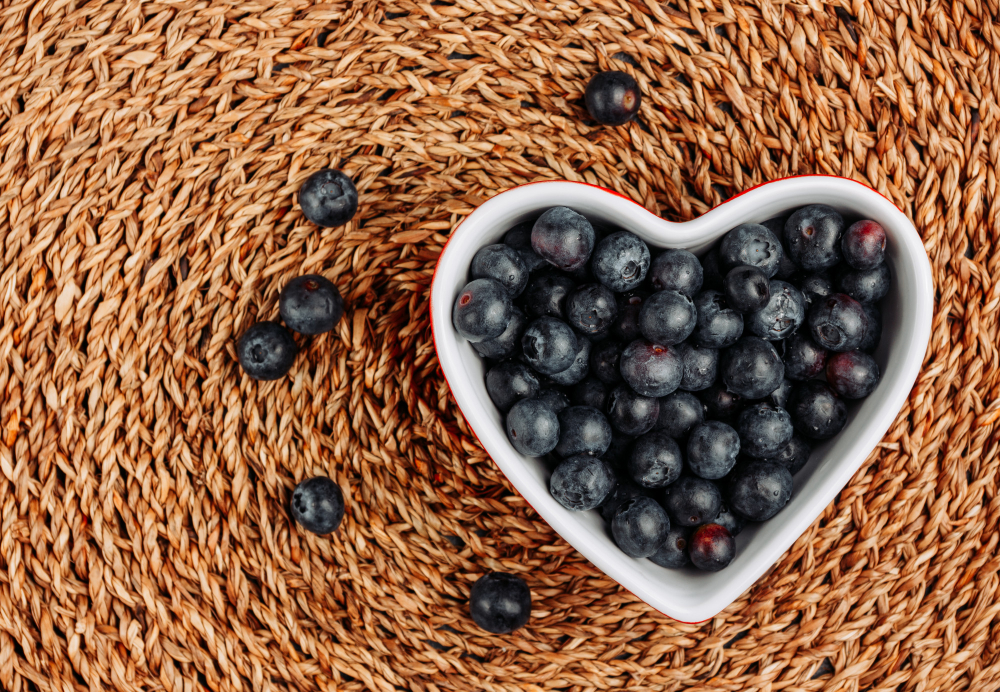
Key Nutrients: Anthocyanins, vitamin C, vitamin K, fiber
Blueberries are often called “brain berries” due to their exceptional cognitive benefits. These small fruits pack a powerful punch of antioxidants, particularly anthocyanins, which give blueberries their distinctive color and provide remarkable brain-protective properties.
The Science
Research from Tufts University shows that blueberries can improve or delay short-term memory loss. The anthocyanins in blueberries cross the blood-brain barrier and concentrate in brain regions associated with learning and memory.
A study published in the Journal of Agricultural and Food Chemistry found that blueberry supplementation improved memory performance and reduced symptoms of depression in older adults with early memory decline.
Brain Benefits
- Improves short-term memory and recall
- Enhances communication between brain cells
- Reduces oxidative stress and inflammation
- Protects brain cells from damage
- Improves learning capacity
- Delays age-related cognitive decline
How to Incorporate
- Add fresh or frozen blueberries to morning smoothies
- Mix into Greek yogurt with nuts and seeds
- Top whole-grain oatmeal with fresh blueberries
- Enjoy as a mid-afternoon snack (1 cup serving)
- Blend into homemade protein shakes
Additional Berry Benefits
While blueberries lead the pack, other berries like strawberries, blackberries, and raspberries also provide brain-boosting antioxidants. A varied berry intake ensures you receive a broad spectrum of beneficial compounds.
3. Dark Chocolate: Cognitive Enhancement

Key Nutrients: Flavonoids, caffeine, antioxidants, iron, magnesium
Dark chocolate (70% cacao or higher) is more than a delicious treat—it’s a scientifically-validated brain booster. The flavonoids in dark chocolate improve blood flow to the brain and enhance cognitive function.
The Science
Research published in the journal Frontiers in Nutrition demonstrates that cocoa flavonoids can improve cognitive function, particularly in tasks requiring sustained attention. These compounds increase blood flow to the brain and stimulate the growth of neurons and blood vessels in parts of the brain involved in memory and learning.
A study from Columbia University found that consuming high-flavanol cocoa for three months improved memory in older adults, essentially reversing age-related memory decline by the equivalent of two to three decades.
Brain Benefits
- Enhances focus and concentration
- Improves memory formation and retention
- Increases blood flow to the brain
- Provides gentle mental energy through caffeine
- Reduces mental fatigue
- Protects brain cells from oxidative damage
How to Incorporate
- Choose dark chocolate with 70-85% cacao content
- Limit portion sizes to 1-2 ounces (28-56 grams) daily
- Enjoy as an afternoon pick-me-up instead of sugary snacks
- Add cacao nibs to smoothies or yogurt bowls
- Make hot cocoa with unsweetened cacao powder
Quality Matters
Not all chocolate is created equal. Milk chocolate and heavily processed chocolate products contain less beneficial flavonoids and more sugar, which can negate the cognitive benefits. Always choose high-quality dark chocolate with minimal added sugars.
4. Nuts and Seeds: Brain Fuel
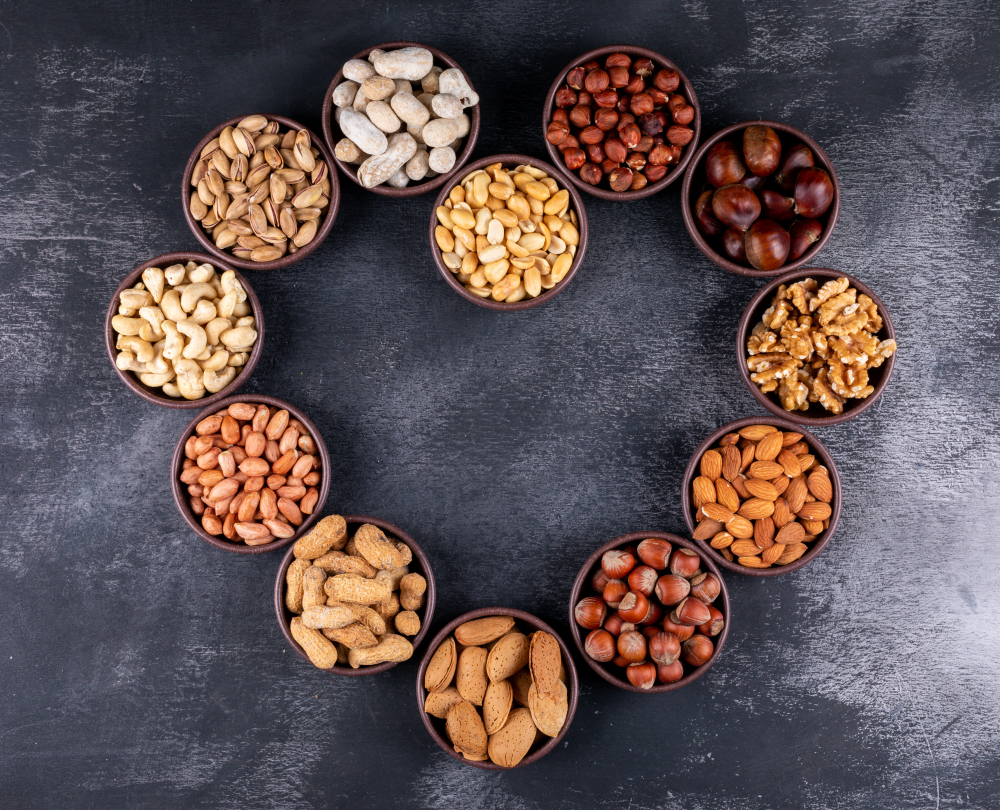
Key Nutrients: Vitamin E, omega-3s, protein, magnesium, zinc
Nuts and seeds are nutrient-dense foods that provide essential fats, proteins, and micronutrients crucial for optimal brain function. Walnuts, almonds, pumpkin seeds, and sunflower seeds are particularly beneficial for cognitive health.
The Science
Research from the American Heart Association shows that regular nut consumption is associated with better cognitive function in older adults. Vitamin E, abundant in nuts and seeds, is a powerful antioxidant that protects brain cells from oxidative stress and age-related cognitive decline.
A study published in the Journal of Nutrition, Health & Aging found that higher walnut consumption was associated with improved cognitive test scores, including memory, concentration, and information processing speed.
Brain Benefits
Walnuts:
- Rich in alpha-linolenic acid (plant-based omega-3)
- Improves memory and cognitive flexibility
- Reduces brain inflammation
Almonds:
- High in vitamin E for neuroprotection
- Supports acetylcholine production (memory neurotransmitter)
- Provides sustained energy for mental performance
Pumpkin Seeds:
- Rich in zinc for memory and cognition
- Contains magnesium for stress reduction
- Supports nerve signal transmission
Sunflower Seeds:
- Excellent source of vitamin E
- Contains tryptophan for mood regulation
- Provides selenium for cognitive function
How to Incorporate
- Snack on a handful (1/4 cup) of mixed nuts daily
- Add chopped walnuts to morning oatmeal or yogurt
- Sprinkle pumpkin seeds on salads or roasted vegetables
- Make homemade trail mix with nuts, seeds, and dark chocolate
- Use almond butter on whole-grain toast or in smoothies
Optimal Portions
While nuts and seeds are incredibly nutritious, they’re calorie-dense. Stick to one to two ounces (28-56 grams) daily for optimal benefits without excessive calorie intake.
5. Leafy Green Vegetables: Cognitive Protection

Key Nutrients: Folate, vitamin K, lutein, beta-carotene, vitamin E
Leafy greens like spinach, kale, collard greens, and Swiss chard are nutritional powerhouses that support brain health and cognitive function. These vegetables are rich in brain-protective nutrients that slow cognitive decline.
The Science
A landmark study published in the journal Neurology followed 960 participants for five years and found that eating one serving of leafy green vegetables daily was associated with slower cognitive decline. Participants who ate leafy greens experienced cognitive abilities equivalent to being 11 years younger than those who rarely consumed these vegetables.
Research from Rush University Medical Center demonstrates that the combination of nutrients in leafy greens—particularly vitamin K, lutein, folate, and beta-carotene—works synergistically to protect brain health.
Brain Benefits
- Slows age-related cognitive decline
- Improves memory and processing speed
- Protects against neurodegenerative diseases
- Reduces inflammation in the brain
- Supports healthy blood flow to the brain
- Provides neuroprotective antioxidants
How to Incorporate
- Add spinach or kale to morning smoothies
- Create large mixed green salads for lunch
- Sauté Swiss chard or collard greens with garlic as a side dish
- Blend spinach into pasta sauces and soups
- Make green juices with kale, cucumber, and apple
Preparation Tips
Lightly cooking leafy greens can increase the bioavailability of certain nutrients. However, raw greens in salads and smoothies also provide excellent benefits. Vary your preparation methods for maximum nutritional diversity.
6. Eggs: Complete Brain Food

Key Nutrients: Choline, vitamin B12, selenium, protein, healthy fats
Eggs are one of nature’s most complete foods, containing almost every nutrient your brain needs. The yolk is particularly rich in choline, a precursor to acetylcholine, a neurotransmitter essential for memory and learning.
The Science
Research published in the American Journal of Clinical Nutrition shows that adequate choline intake is associated with better cognitive performance, particularly in tasks involving memory. The American Pregnancy Association emphasizes that choline is crucial for brain development and function throughout life.
A study from Boston University found that higher choline intake was associated with better verbal and visual memory. Participants with adequate choline levels performed significantly better on memory tests than those with lower intake.
Brain Benefits
- Supports acetylcholine production for memory
- Provides high-quality protein for neurotransmitter synthesis
- Contains B vitamins crucial for brain health
- Supports mood regulation and mental well-being
- Protects brain cell membranes
- Reduces inflammation in the nervous system
How to Incorporate
- Eat 1-2 whole eggs daily (including the yolk for choline)
- Make vegetable omelets for breakfast
- Add hard-boiled eggs to salads
- Prepare egg muffins with vegetables for meal prep
- Enjoy poached eggs on whole-grain toast with avocado
Addressing Concerns
Despite previous concerns about dietary cholesterol, current research from the Mayo Clinic shows that eggs don’t significantly impact blood cholesterol levels in most people. The brain benefits of whole eggs, particularly from the choline-rich yolk, far outweigh outdated dietary concerns.
7. Avocados: Healthy Fat for Brain Function
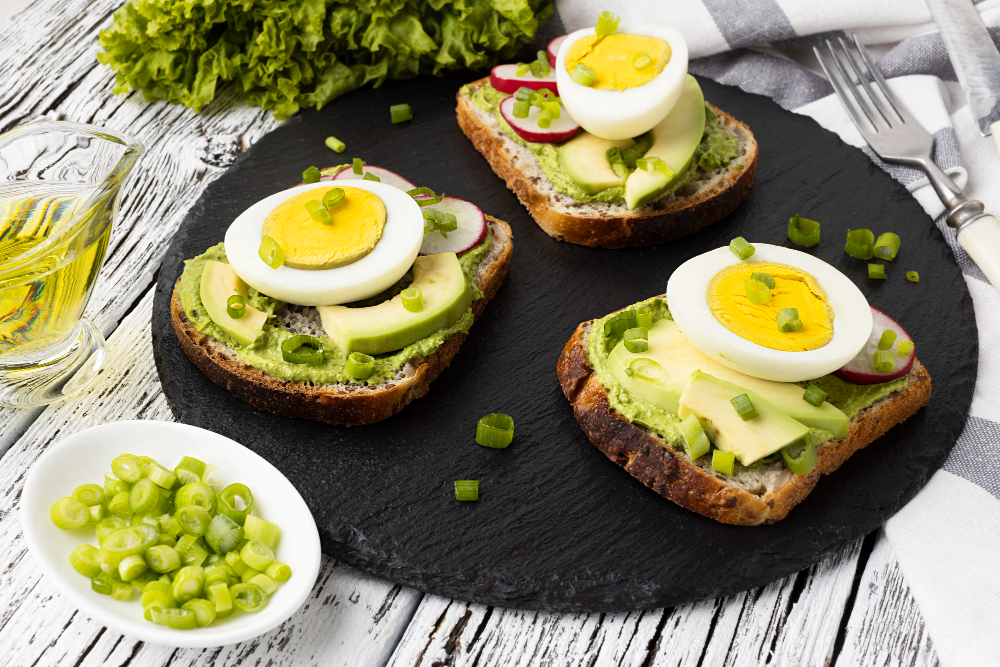
Key Nutrients: Monounsaturated fats, vitamin K, folate, vitamin C, potassium
Avocados are nutrient-dense fruits packed with healthy monounsaturated fats that support brain health. These creamy fruits improve blood flow to the brain and help maintain healthy blood pressure, both crucial for cognitive function.
The Science
Research from Tufts University found that consuming one avocado daily for six months improved cognitive function in older adults, particularly in tasks requiring attention and problem-solving. The monounsaturated fatty acids in avocados support the structure of brain cells and facilitate efficient communication between neurons.
Studies show that the combination of healthy fats, fiber, and micronutrients in avocados supports cardiovascular health, which is directly linked to brain health. Better cardiovascular function means improved blood flow and oxygen delivery to the brain.
Brain Benefits
- Improves blood flow to the brain
- Supports healthy brain cell membranes
- Reduces blood pressure (beneficial for cognitive function)
- Provides anti-inflammatory compounds
- Enhances absorption of fat-soluble vitamins
- Supports focus and concentration
How to Incorporate
- Add avocado slices to morning toast or eggs
- Blend into smoothies for creamy texture
- Make homemade guacamole for a brain-healthy snack
- Add to salads for satiety and nutrient absorption
- Use as a replacement for mayonnaise or butter
Portion Control
While avocados are incredibly nutritious, they’re calorie-dense. One-third to one-half of a medium avocado per day provides substantial benefits without excessive calories.
8. Green Tea: Mental Clarity and Focus
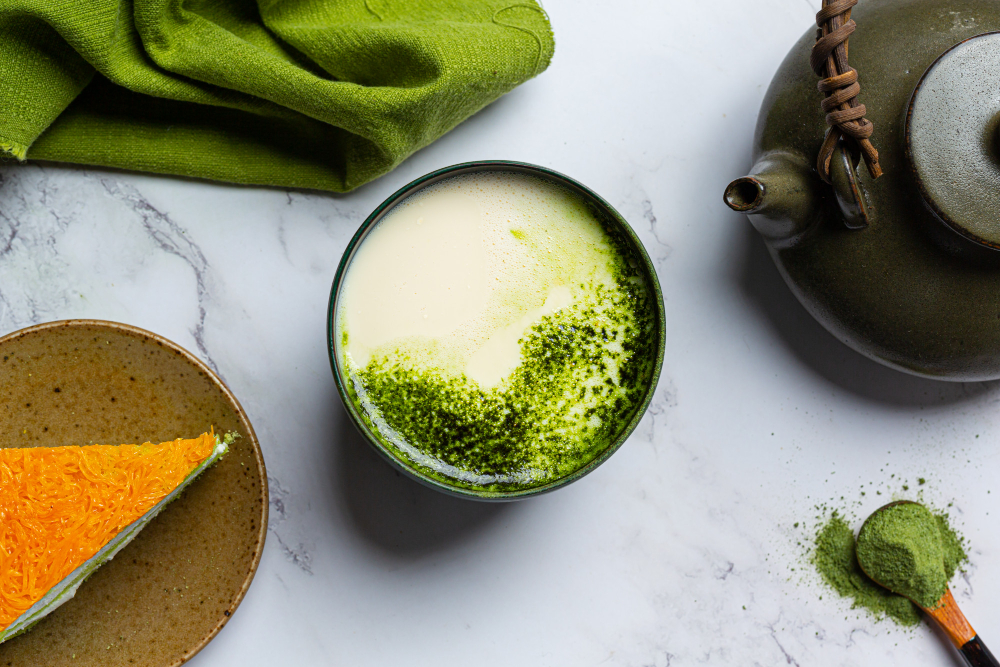
Key Nutrients: L-theanine, caffeine, EGCG (epigallocatechin gallate), antioxidants
Green tea has been consumed for thousands of years and is renowned for its cognitive-enhancing properties. The unique combination of caffeine and L-theanine in green tea provides alert relaxation—mental clarity without jitters.
The Science
Research published in Psychopharmacology demonstrates that the combination of L-theanine and caffeine in green tea improves attention, working memory, and task-switching accuracy. L-theanine increases alpha brain wave activity, associated with a calm yet alert mental state.
A study from the University of Basel in Switzerland found that green tea extract increases connectivity between brain regions, particularly those involved in working memory processing. This enhanced connectivity translates to improved cognitive performance.
Brain Benefits
- Enhances focus and concentration
- Improves working memory
- Promotes alert relaxation (calm focus)
- Protects brain cells from oxidative damage
- Reduces mental fatigue
- May lower risk of cognitive decline
How to Incorporate
- Drink 2-3 cups of green tea daily
- Replace morning coffee with matcha (concentrated green tea)
- Enjoy iced green tea as a refreshing afternoon beverage
- Use green tea as a base for smoothies
- Try different varieties (sencha, matcha, gyokuro) for variety
Optimal Brewing
Steep green tea at 160-180°F (70-80°C) for 2-3 minutes to extract beneficial compounds without excessive bitterness. Avoid boiling water, which can destroy delicate antioxidants and create a bitter taste.
9. Turmeric: Neuroprotective Spice
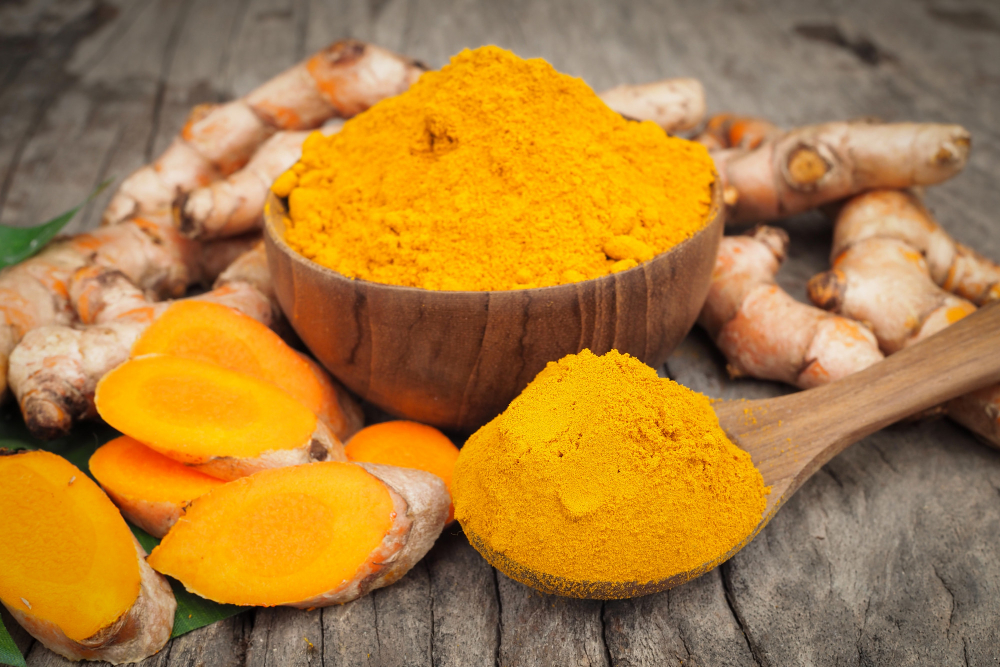
Key Nutrients: Curcumin, antioxidants, anti-inflammatory compounds
Turmeric, and specifically its active compound curcumin, has powerful brain-protective properties. This golden spice has been used in traditional medicine for thousands of years and modern science is now validating its cognitive benefits.
The Science
Research from UCLA found that curcumin improves memory and mood in people with mild, age-related memory loss. The study showed that participants taking curcumin supplements experienced significant improvements in memory and attention abilities, with brain imaging showing less accumulation of abnormal proteins linked to Alzheimer’s disease.
Studies published in the Journal of Psychopharmacology demonstrate that curcumin increases BDNF (brain-derived neurotrophic factor), a growth hormone that functions in the brain. Higher BDNF levels are associated with improved cognitive function and reduced risk of brain diseases.
Brain Benefits
- Increases BDNF for neuron growth
- Reduces brain inflammation
- Crosses the blood-brain barrier for direct brain benefits
- Improves memory and attention
- Protects against age-related cognitive decline
- May reduce risk of Alzheimer’s disease
How to Incorporate
- Add turmeric to scrambled eggs or omelets
- Make golden milk (turmeric latte) with coconut milk
- Season roasted vegetables with turmeric and black pepper
- Add to smoothies (1/2 teaspoon per serving)
- Create curry dishes with turmeric as the base spice
- Take curcumin supplements (consult healthcare provider for dosage)
Absorption Enhancement
Curcumin has poor bioavailability on its own. Consuming turmeric with black pepper (which contains piperine) increases curcumin absorption by 2,000%. Adding healthy fats also enhances absorption, so combine turmeric with coconut oil or olive oil for maximum benefits.
10. Whole Grains: Sustained Brain Energy
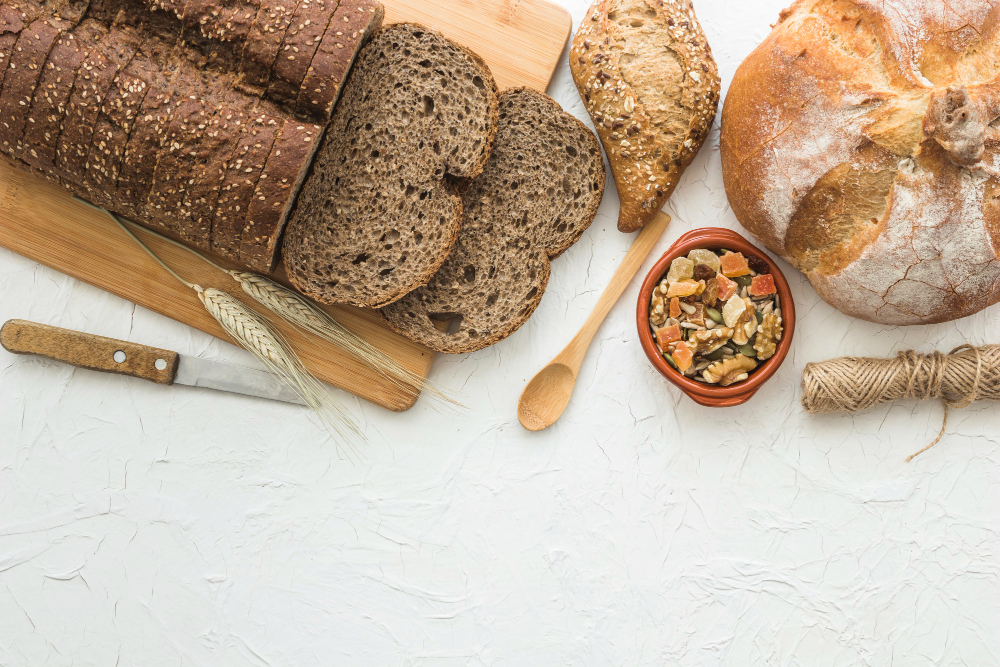
Key Nutrients: B vitamins, fiber, complex carbohydrates, minerals
Whole grains provide the steady glucose supply your brain needs to function optimally. Unlike refined carbohydrates that cause blood sugar spikes and crashes, whole grains release glucose gradually, supporting sustained mental performance.
The Science
The brain relies on glucose as its primary fuel source. Research from the American Journal of Clinical Nutrition shows that consuming whole grains improves cognitive performance, particularly in tasks requiring sustained attention and memory.
A study published in the British Journal of Nutrition found that breakfast consumption of whole grains improved memory, attention, and information processing speed compared to refined grain breakfasts or skipping breakfast entirely.
Brain Benefits
- Provides steady glucose for sustained mental energy
- Prevents blood sugar crashes that impair cognition
- Rich in B vitamins essential for neurotransmitter production
- Supports healthy blood flow to the brain
- Improves focus and concentration
- Reduces mental fatigue throughout the day
Best Whole Grain Choices
Oats:
- Rich in beta-glucan fiber for stable blood sugar
- Contains avenanthramides (anti-inflammatory compounds)
- Excellent breakfast choice for sustained morning focus
Quinoa:
- Complete protein with all essential amino acids
- High in iron for oxygen transport to the brain
- Versatile for any meal
Brown Rice:
- Rich in manganese and selenium
- Supports neurotransmitter production
- Easy to prepare in batches
Whole Wheat:
- High in B vitamins, particularly B6 and folate
- Supports homocysteine metabolism (important for brain health)
- Available in many forms (bread, pasta, berries)
How to Incorporate
- Start mornings with steel-cut or rolled oats
- Choose whole-grain bread over white bread
- Replace white rice with brown rice or quinoa
- Snack on whole-grain crackers with nut butter
- Use whole-wheat pasta or alternative grain pasta
Portion Guidance
Aim for 3-5 servings of whole grains daily. One serving equals 1 slice of whole-grain bread, 1/2 cup cooked grains, or 1 ounce of whole-grain cereal.
Creating a Brain-Healthy Eating Pattern
Individual foods provide specific benefits, but the overall dietary pattern matters most for brain health. The Mediterranean diet and MIND diet (Mediterranean-DASH Intervention for Neurodegenerative Delay) have the strongest research support for cognitive health.
The MIND Diet Framework
Developed by researchers at Rush University, the MIND diet specifically targets brain health. It emphasizes:
- Leafy greens (6+ servings weekly)
- Other vegetables (1+ serving daily)
- Berries (2+ servings weekly)
- Nuts (5+ servings weekly)
- Whole grains (3+ servings daily)
- Fish (1+ serving weekly)
- Beans and legumes (3+ servings weekly)
- Olive oil as primary fat
- Limited red meat, butter, cheese, and sweets
Research shows that people who follow the MIND diet have cognitive abilities equivalent to being 7.5 years younger than those who don’t follow the diet.
Daily Brain-Boosting Meal Plan Example
Breakfast:
- Steel-cut oats with blueberries, walnuts, and cinnamon
- Green tea
Mid-Morning Snack:
- Apple slices with almond butter
Lunch:
- Large spinach salad with grilled salmon, avocado, pumpkin seeds, and olive oil dressing
- Whole-grain crackers
Afternoon Snack:
- Dark chocolate (1 ounce) with a handful of almonds
Dinner:
- Baked cod with turmeric and herbs
- Quinoa pilaf
- Roasted vegetables with olive oil
- Side salad with mixed greens
Evening:
- Chamomile tea or golden milk (turmeric latte)
This meal plan incorporates all ten brain-boosting foods while providing balanced nutrition throughout the day.
Lifestyle Factors That Enhance Dietary Benefits
While nutrition is crucial for brain health, other lifestyle factors work synergistically with diet to optimize cognitive function:
Physical Exercise
Regular physical activity increases blood flow to the brain and promotes the growth of new neurons. Research shows that combining a brain-healthy diet with regular exercise provides greater cognitive benefits than either intervention alone.
Quality Sleep
Sleep is when the brain consolidates memories and clears metabolic waste. Aim for 7-9 hours of quality sleep nightly to maximize the cognitive benefits of brain-healthy foods.
Stress Management
Chronic stress impairs memory and cognitive function. Practices like meditation, yoga, and deep breathing complement dietary approaches to brain health.
Mental Stimulation
Challenging your brain through learning, puzzles, and new experiences promotes neuroplasticity. Combined with brain-boosting nutrition, mental stimulation supports lifelong cognitive vitality.
Social Connection
Strong social relationships are associated with better cognitive function in older adults. Share brain-healthy meals with friends and family to combine nutritional and social benefits.
When to Consult Healthcare Professionals
While dietary changes can significantly improve cognitive function, certain situations warrant professional consultation:
- Persistent memory problems or cognitive decline
- Difficulty concentrating despite lifestyle changes
- Symptoms of depression or anxiety affecting daily life
- History of traumatic brain injury
- Family history of Alzheimer’s or dementia
- Planning significant dietary changes with existing health conditions
A healthcare provider can assess your individual situation, rule out underlying medical issues, and provide personalized recommendations for supporting brain health.
Frequently Asked Questions
How quickly will I notice improvements in mental clarity from these foods?
Some benefits appear within days or weeks, particularly improvements in focus and energy levels from stable blood sugar and increased omega-3 intake. However, significant cognitive improvements and neuroprotective effects develop over months of consistent dietary patterns. Think of brain nutrition as a long-term investment in cognitive health rather than a quick fix.
Can I take supplements instead of eating these foods?
While supplements can help address specific deficiencies, whole foods provide a complex matrix of nutrients, fiber, and phytochemicals that work synergistically. Supplements cannot replicate this complexity. Focus on food first, and use supplements to fill gaps under professional guidance. For example, if you don’t eat fish, an omega-3 supplement may be beneficial, but it shouldn’t replace a varied, nutrient-dense diet.
Are organic versions of these foods more beneficial for brain health?
Organic produce may reduce exposure to pesticides, which some research suggests could affect neurological health. However, the most important factor is consuming these brain-healthy foods regularly, whether organic or conventional. If budget is a concern, prioritize organic options for the “Dirty Dozen” (foods highest in pesticide residues) and buy conventional for others.
How much of these foods should I eat daily?
Rather than focusing on specific amounts of individual foods, aim for dietary patterns that include these foods regularly. The MIND diet provides good guidelines: leafy greens 6+ times weekly, berries 2+ times weekly, nuts daily, fish weekly, and whole grains 3+ times daily. Variety is key—rotate through different brain-boosting foods rather than eating the same items every day.
Can these foods help prevent Alzheimer’s disease?
Research shows that dietary patterns rich in these foods are associated with reduced risk of cognitive decline and Alzheimer’s disease. The MIND diet, which emphasizes these foods, has been linked to a 53% reduced risk of Alzheimer’s in people who adhere closely to it. However, genetics and other factors also play roles. Think of nutrition as one important component of a comprehensive brain health strategy.
Will eating these foods improve my productivity at work?
Yes, many of these foods provide benefits that directly translate to better work performance. Foods that stabilize blood sugar (whole grains, nuts) prevent energy crashes. Omega-3s and antioxidants support focus and concentration. Green tea provides alert focus without jitters. Most people notice improved sustained attention and mental stamina within a few weeks of dietary improvements.
Are there foods I should avoid for optimal brain health?
While this article focuses on foods to include, limiting certain foods also supports brain health. Minimize refined sugars, which cause blood sugar instability and inflammation. Reduce processed foods high in trans fats and excessive omega-6 fatty acids. Limit alcohol consumption, as excessive alcohol impairs cognitive function. Focus primarily on adding brain-healthy foods rather than obsessing over restrictions.
Can children and teenagers benefit from these foods?
Absolutely. Brain development continues through adolescence, making nutrition crucial during childhood and teen years. These foods support healthy brain development, academic performance, mood regulation, and attention. The same principles apply across ages, though specific caloric needs vary. Encourage children to develop preferences for these brain-healthy foods early for lifelong cognitive benefits.
What if I have dietary restrictions or allergies?
Most people can find suitable brain-boosting options within their dietary constraints. If you’re allergic to fish, focus on plant-based omega-3s from walnuts and flaxseeds, or consider algae-based omega-3 supplements. If you’re vegan, emphasize nuts, seeds, leafy greens, berries, avocados, and whole grains. Work with a registered dietitian to ensure you’re meeting nutritional needs for brain health within your dietary framework.
How do I know if my diet is improving my brain function?
Track subjective improvements like better focus, improved memory recall, sustained energy throughout the day, better mood, and enhanced problem-solving abilities. You might also notice improved sleep quality and reduced brain fog. Keep a journal tracking cognitive symptoms weekly to identify patterns. For objective assessment, work with healthcare providers who can perform cognitive testing before and after dietary changes.
Conclusion
The foods you eat profoundly impact your brain’s structure and function. These ten brain-boosting foods—fatty fish, blueberries, dark chocolate, nuts and seeds, leafy greens, eggs, avocados, green tea, turmeric, and whole grains—provide the essential nutrients your brain needs for optimal performance.
Research consistently shows that dietary patterns emphasizing these foods support cognitive function, protect against age-related decline, and may reduce the risk of neurodegenerative diseases. The key is consistency—these foods provide the greatest benefits when consumed regularly as part of an overall brain-healthy dietary pattern.
Start by incorporating one or two of these foods into your daily routine, then gradually expand your repertoire. Small, consistent changes compound over time, leading to significant improvements in mental clarity, focus, and long-term brain health.
Your brain is your most valuable asset. Nourish it well with these scientifically-validated, delicious, and accessible foods. The investment you make in brain-healthy nutrition today pays dividends in cognitive vitality for years to come.
Remember that nutrition is just one component of comprehensive brain health. Combine these dietary strategies with regular exercise, quality sleep, stress management, mental stimulation, and strong social connections for optimal cognitive function throughout your life.





